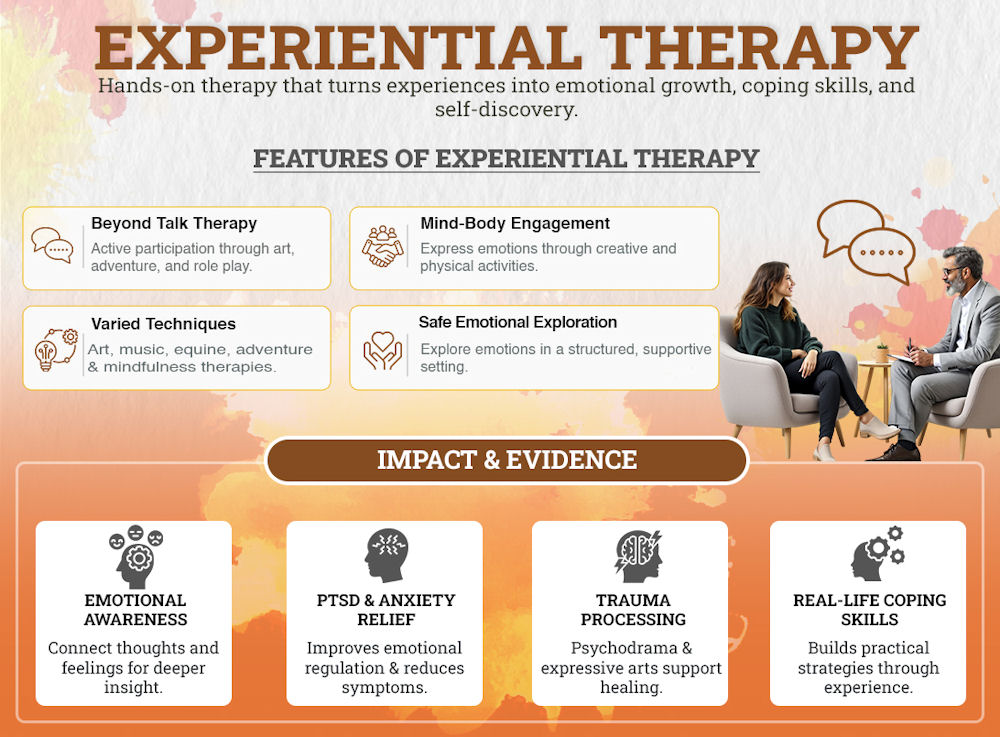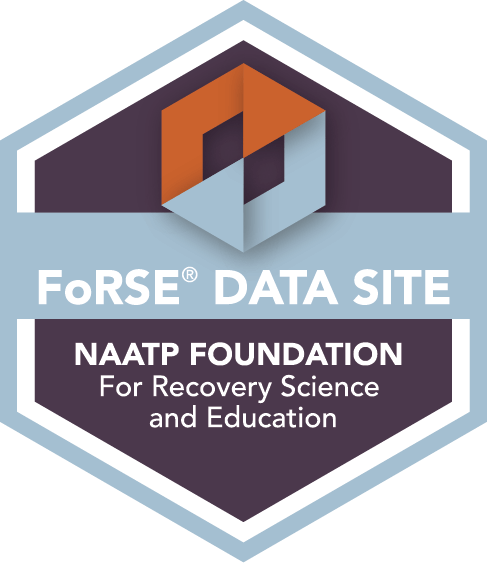
Nontraditional addiction treatment goes beyond standard talk therapy. It includes activities that help people face deep-rooted emotions and develop healthier coping skills. These treatments address the whole person, not just their addiction.
At Northern Illinois Recovery in Crystal Lake, Illinois, our experiential therapy programs offer clients an innovative and hands-on approach to addiction and mental health treatment. Unlike traditional talk therapy, experiential therapy focuses on engaging clients through activities that promote self-awareness, emotional growth, and coping skills. By integrating physical, creative, and adventure-based experiences, clients explore underlying issues in a supportive, structured environment.
This type of psychotherapy involves immediate experiences or interactions that can lead to a transformation in an individual’s self-perception or understanding of the surrounding world. This therapeutic approach is a crucial component of a successful treatment regimen, offering patients a secure environment to delve into complex thoughts and difficult emotions.
It facilitates significant connections between these thoughts and feelings while fostering the development of healthier coping mechanisms. With the support of a qualified therapist, this form of therapy encourages individuals to engage fully in the present moment, avoiding the suppression of both pain and joy through substances such as drugs or alcohol.
Experiential therapy may not be the first type of therapy that comes to mind. Unlike traditional therapy sessions held in an office, experiential psychotherapy can occur in various settings such as art studios, horse stables, or during outdoor excursions. This approach emphasizes engaging in physical, hands-on activities that create interactive opportunities for individuals to connect with their therapist.
Types of Experiential Therapy
- Art Therapy: Clients use painting, drawing, or sculpting to express emotions. This helps process trauma and develop healthy coping skills.
- Music Therapy: Listening to, creating, or playing music reduces stress and promotes emotional healing. It helps clients connect with their feelings safely.
- Equine Therapy: Caring for and interacting with horses builds trust, responsibility, and self-awareness. It also improves emotional regulation and communication.
- Adventure Therapy: Outdoor activities like hiking, rock climbing, or kayaking challenge clients to build confidence and problem-solving skills. It promotes teamwork and resilience.
- Psychodrama Therapy: Clients act out past experiences in a safe setting. This helps them process emotions and change negative thought patterns.
- Mindfulness and Meditation: Practicing mindfulness helps clients stay present and manage cravings. Meditation reduces stress and promotes inner peace.
- Drama Therapy: Clients use acting, role-playing, or storytelling to express emotions. This helps them process trauma and gain new perspectives on their experiences.
- Dance and Movement Therapy: Moving the body through yoga, dance, or gentle exercises releases stress and improves emotional well-being. It helps clients reconnect with themselves.
- Wilderness Therapy: Spending time in nature through hiking, camping, or survival skills builds confidence and resilience. It teaches patience, responsibility, and problem-solving.
- Animal-Assisted Therapy: Interacting with therapy animals like dogs or rabbits provides comfort and reduces anxiety. It builds trust and emotional connection.
- Expressive Writing Therapy: Journaling or writing about feelings helps process difficult emotions. It encourages self-reflection and helps release painful thoughts.
- Role Play: Role-playing helps clients safely explore emotions, practice new behaviors, and gain confidence in handling real-life challenges.
Each of these therapies helps people heal in ways that feel natural and meaningful. They offer a new path to recovery. A central concept in 12-step recovery, as outlined in the Big Book of Alcoholics Anonymous, is the necessity for a change in one’s psyche, often referred to as a “psychic change.”
This transformation is unique to each individual but generally entails a significant shift in perspective. In therapeutic environments, such changes are frequently catalyzed by experiences or encounters rather than merely through the absorption of information. When individuals concentrate on a specific activity or task rather than the therapy itself, they often exhibit more genuine reactions and emotions.
Numerous effective addiction treatment centers incorporate experiential therapy to enhance the healing journey. It has been observed that patients who tend to rationalize and intellectualize their addiction, believing that information alone can protect them from their first drink, often gain the most from this approach. If overcoming alcoholism were solely a matter of information, individuals could achieve sobriety simply by studying the subject.
The path to sobriety is far more intricate, involving challenges related to self-esteem, emotional triggers, and profound feelings. For those who struggle to articulate profound emotions or discuss painful experiences, experiential therapy can be transformative.

How Does Experiential Therapy Work?
For addiction treatment, experiential therapy helps clients face their struggles in a nonjudgmental way. It allows them to process painful experiences, learn coping skills, and build emotional resilience. By engaging the mind and body, this therapy helps people develop healthier ways to handle stress and cravings.

Experiential therapy is also effective for mental health conditions like anxiety, depression, and post-traumatic stress disorder (PTSD). It helps clients explore their emotions safely and practice new ways to respond to challenges. This approach encourages personal growth and long-term emotional healing.
The Benefits of Experiential Therapy
- Better Communication: Clients learn to express thoughts and emotions openly, improving their ability to connect with others.
- Stronger Social Skills: Practicing teamwork and problem-solving helps clients build healthy relationships and resolve conflicts.
- Healing from Trauma: Hands-on activities help clients process painful memories in a safe and supportive way.
- Safe Self-Expression: Creative outlets like art and music allow clients to express emotions they struggle to put into words.
- Building Trust: Therapy activities teach clients to trust themselves and others, creating deeper connections.
- Understanding Yourself: Clients explore their values, beliefs, and identity, helping them make choices that align with who they are.
- Managing Stress: Techniques like mindfulness, movement, and breathing exercises help clients healthily handle stress.
- Mind-Body Awareness: Physical activities like yoga and equine therapy help clients connect with their emotions and body.
- Facing Fears: Challenging activities build confidence and teach clients that they can overcome obstacles.
- Breaking Denial: Experiential therapy helps clients see how addiction affects their lives, motivating them to change.
- Boosting Self-Esteem: Achieving small goals in therapy activities helps clients rebuild confidence in themselves.
- Healthy Stress Relief: Clients learn positive ways to cope with stress, like art, exercise, or meditation.
- Stronger Support System: Group activities help clients feel connected, supported, and less alone.
- Emotional Regulation: Therapy teaches clients to recognize emotions and respond to them.
- Overcoming Guilt and Shame: Experiential therapy helps clients release negative emotions and build self-compassion.
- Developing Problem-Solving Skills: Hands-on activities encourage critical thinking and resilience in handling life’s challenges.
- Encouraging Patience and Persistence: Experiential therapy helps clients stay committed to recovery, even when progress feels slow.
Experiential therapy offers a unique path to healing. It helps people connect with their emotions, rebuild trust, and develop lifelong coping skills.

Why is Experiential Therapy Effective in Treating Addiction
Addiction often comes from deeper emotional wounds, trauma, or unhealthy thought patterns. Experiential therapy helps uncover these root causes in a safe, supportive space. It also allows clients to develop confidence, emotional awareness, and new ways to handle stress and cravings.
By engaging the mind and body, experiential therapy makes healing feel more natural. It helps clients break free from destructive behaviors and build a foundation for lasting recovery. Experiential therapy encourages clients to actively participate in their recovery rather than just discussing their experiences. Activities such as art therapy, outdoor adventures, role-playing, mindfulness exercises, and team-building challenges help clients:
- Develop healthier coping mechanisms
- Improve emotional regulation
- Strengthen interpersonal skills
- Increase self-confidence and self-awareness
- Address trauma in a safe, nonverbal way
This approach complements traditional therapies like individual counseling, group therapy, and cognitive-behavioral therapy (CBT), offering a holistic treatment experience that addresses mind, body, and spirit.
This approach complements traditional therapies like individual counseling, group therapy, and cognitive-behavioral therapy (CBT), offering a holistic treatment experience that addresses mind, body, and spirit.
Conditions Treated with Experiential Therapy
This therapy helps treat various conditions, including:
- Substance Use Disorders: Helps address emotional triggers and develop healthier coping strategies.
- Anxiety and Depression: Encourages self-expression and stress relief to improve emotional well-being.
- Post-Traumatic Stress Disorder (PTSD): Helps process trauma in a safe and controlled way.
- Eating Disorders: Supports healthy body image and emotional regulation.
- Personality Disorders: Builds emotional awareness and improves relationships.
Who Can Benefit from Experiential Therapy
Experiential therapy is suitable for individuals struggling with:
- Substance use disorders
- Co-occurring mental health conditions
- Trauma or unresolved emotional challenges
- Anxiety, depression, or stress-related issues
Whether you are new to therapy or have struggled with traditional approaches, experiential therapy can provide meaningful breakthroughs that support long-term recovery.

Our Approach at Northern Illinois Recovery
Our trained clinicians guide clients through customized experiential therapy sessions aligned with each individual’s treatment plan. We combine structured activities with professional guidance to ensure safety, emotional support, and measurable progress.
Integrating Experiential Therapy into Your Treatment Plan
Experiential therapy is integrated into our broader continuum of care, which includes:
- Individual Therapy: Personalized sessions with licensed therapists
- Group Therapy: Collaborative healing through shared experiences
- Family Therapy: Rebuilding and strengthening relationships
- Aftercare Planning: Continued support to maintain recovery after treatment
By combining experiential therapy with other therapeutic modalities, clients gain a deeper understanding of their behaviors, triggers, and strengths, empowering them to achieve lasting recovery.
Experiential Therapy FAQs
Experiential therapy is a hands-on therapeutic approach that empowers individuals through activities such as art, adventure, role-playing, and mindfulness exercises. It encourages active participation to promote emotional growth, self-awareness, and coping skills.
Activities can include outdoor adventures, team-building exercises, art and music therapy, role-playing scenarios, mindfulness practices, and other hands-on experiences designed to help individuals explore their emotions and build coping skills.
No. All activities are designed to be accessible and supportive. They are provided guidance from trained therapists to ensure safety and comfort.
Yes. Experiential therapy allows individuals to process trauma in a nonverbal and controlled environment. This can make it easier to explore difficult emotions than in solely using methods like traditional talk therapy.
The frequency depends on the treatment plan. Some individuals participate in daily activities, while others may engage in weekly or bi-weekly sessions as part of their overall treatment program.
Yes. Activities can be adapted to accommodate different physical abilities and medical needs, ensuring all individuals can participate safely.
Individuals can expect a structured, guided experience that encourages reflection, emotional expression, and skill-building. Sessions are facilitated by licensed therapists who provide support and feedback throughout.
By teaching coping strategies, promoting self-awareness, and encouraging teamwork and personal growth, experiential therapy equips individuals with practical tools to manage stress and triggers after treatment.
Absolutely. Experiential therapy complements individual counseling, group therapy, family therapy, cognitive-behavioral therapy (CBT), and medication-assisted treatment, creating a comprehensive and holistic approach to recovery.
Overcome Your Challenges with Experiential Therapy
At Northern Illinois Recovery Center (NIRC), we understand these struggles. That’s why we offer experiential therapy to help individuals heal in a hands-on, meaningful way. Through creative activities, movement, and real-life experiences, individuals learn to express emotions, manage stress, and rebuild confidence. This approach helps people break free from negative patterns and develop healthier ways to cope.
You don’t have to face recovery alone. Our caring team is ready to help and support you at every stage. Call us today to learn more about our programs and take the first step toward lasting healing.






